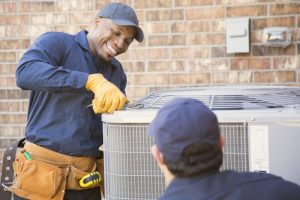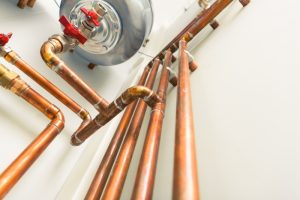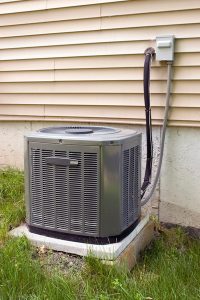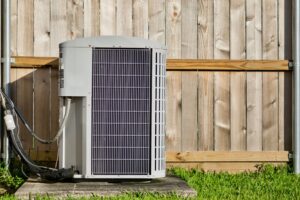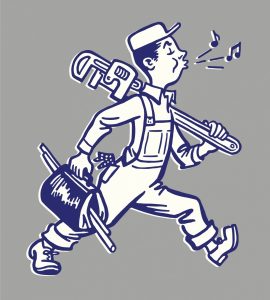What Are the Most Common Questions About Air Conditioning?
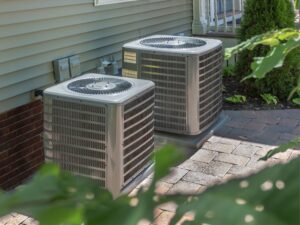 Have questions about your air conditioner? You’re not alone. As temperatures rise and your system kicks into high gear, it’s completely normal to start wondering how it works—or what to do if it suddenly stops working.
Have questions about your air conditioner? You’re not alone. As temperatures rise and your system kicks into high gear, it’s completely normal to start wondering how it works—or what to do if it suddenly stops working.
At Len The Plumber Heating & Air, we hear these questions every day, and we’re here to make things simple. Our mission is to keep your life moving, which means helping you understand your AC system so you can stay cool and worry-free.
Let’s break down some of the most common questions homeowners ask about air conditioning—and the answers you can count on.
How Much Is a New Air Conditioning Unit?
If you plan to replace your air conditioner, you can expect the AC unit cost to fall between $3,800 and $7,500 for most homes. The final price depends on a few key factors, including:
- The size of your home: Larger homes typically need more powerful systems, which can increase the overall cost.
- The unit’s efficiency rating: Higher SEER-rated units are more energy-efficient but often come with a higher upfront price.
- The complexity of the installation: If your installation involves tight spaces, electrical upgrades, or modifications to existing ductwork, it can raise labor and material costs.
The cost of an AC unit isn’t just the equipment itself. Additional expenses like updating ductwork, replacing your thermostat, or labor charges can impact the total.
How Do I Maintain My Air Conditioning System?
Taking care of your AC system doesn’t have to be complicated—but it does make a big difference. With just a few simple steps, you can help avoid those surprise breakdowns that always seem to happen on the hottest day of the year.
To keep your system in good shape, be sure to:
- Change air filters every one to three months to improve airflow and prevent dust buildup
- Clean condenser and evaporator coils once a year to maintain efficient cooling
- Schedule a professional tune-up before the season starts so any small issues can be caught early
Can My Air Conditioning Make Me Sick?
It’s a common concern—and the short answer is that it can, but only if it’s not properly maintained. When your AC system isn’t cleaned or serviced regularly, it can circulate dust, allergens, and even mold throughout your home. For some people, cold, dry air can also irritate the respiratory system or worsen conditions like asthma.
The good news is that simple steps like changing your filters regularly and managing indoor humidity can help keep your air clean and your home healthy.
How Long Do Air Conditioning Units Last?
On average, most air conditioning units last 12 to 15 years. Of course, every system is different—and how it performs over time can depend on a few key factors. If your AC is getting up there in age, here are some signs it might be time to start thinking about a replacement:
- Frequent breakdowns: If your AC needs repairs more often than it used to, it’s a strong sign that key components are wearing out and the system is nearing the end of its lifespan.
- Rising energy bills: An aging unit often becomes less energy-efficient over time, which means it uses more power to cool your home and drives up your monthly utility costs.
- Uneven cooling: When your system struggles to maintain consistent temperatures throughout your home, it could be due to failing parts, ductwork issues, or a system that’s no longer the right size for your needs.
Regular preventive care—like annual tune-ups, filter changes, and system inspections—can help your AC run more efficiently and potentially add years to its life.
Why Is My Air Conditioning Unit Leaking Water?
If you’ve spotted water pooling around your AC unit, it usually means something’s off. This could be due to a clogged condensate drain line, frozen evaporator coils, or even a dirty air filter restricting airflow. When these issues aren’t addressed, they can lead to water damage, mold growth, and, in some cases, a full system shutdown.
While quick fixes like replacing the air filter or flushing the drain line with vinegar can help, persistent leaks are a good reason to call a technician for a proper inspection. Catching the problem early can help you avoid costly repairs and protect your system from further damage.
How Do You Repair an Air Conditioning Unit?
Some problems can be fixed with simple air conditioner troubleshooting, while others call for professional help. If your system isn’t cooling properly, start with a few basic DIY checks:
- Check your thermostat settings: Make sure it’s set to “cool” and the temperature is lower than the current room temperature.
- Inspect the air filter: A dirty or clogged filter can restrict airflow and cause your system to underperform. Replace or clean it if needed.
- Verify the power supply: Ensure the unit is plugged in, the disconnect switch is on, and the circuit breaker hasn’t tripped.
If those don’t solve the problem, a bigger issue could be at play—like a refrigerant leak, electrical malfunction, or a faulty capacitor. A licensed HVAC technician should always handle these kinds of repairs to ensure safe, effective results and keep your system running reliably.
What Is Ductless Air Conditioning?
If you’re looking for a more efficient and flexible way to cool your home, ductless air conditioning might be the answer. Instead of relying on bulky ductwork, these systems use sleek, wall-mounted units paired with an outdoor compressor to deliver cool air right where you need it.
Ductless air conditioning offers several key benefits:
- Energy efficiency: These systems cool only the areas you use, which helps lower your energy bills and reduce overall energy waste.
- Flexible installation: They’re ideal for older homes, new additions, or any space where installing ductwork isn’t practical.
- Quiet operation: Ductless units run quietly, making them a great choice for bedrooms, home offices, and other quiet spaces.
How Does Central Air Conditioning Work?
A central air system cools your home by cycling air through a network of components. The process starts when refrigerant absorbs heat from your indoor air at the evaporator coil, then releases it outside through the condenser. The air handler pushes the cooled air through your ductwork, while the thermostat controls when the system turns on or off. It’s an efficient, behind-the-scenes process that keeps every room consistently cool.
What Is a Mini Split Air Conditioning Unit?
A mini split is a specific type of ductless air conditioning system, but with one big advantage—it allows for zoned cooling, meaning you can control temperatures in different rooms individually. While all ductless systems skip the ductwork, not all offer the same flexibility and control as a mini-split.
Here’s what sets a mini-split apart:
- It has an outdoor unit connected to one or more indoor units via refrigerant lines.
- Each indoor unit can be controlled separately, giving you custom comfort room by room.
- It’s ideal for additions, garages, finished basements, or anywhere you don’t want to install ducts.
Can a Nest Thermostat Replace Heating and Air Conditioning Controls?
In many cases, yes—a Nest thermostat can replace your existing heating and air conditioning controls. It’s compatible with most HVAC systems, but it’s important to check your current wiring setup to be sure. With features like smart scheduling, remote access, and built-in tools to help you save energy, Nest can bring convenience and efficiency to your home.
For more complex systems—like dual-fuel setups or older wiring—professional installation is the safest way to ensure proper Nest thermostat HVAC compatibility.
How Do I Charge My Home Air Conditioning System?
Charging your AC means adding refrigerant—and it’s not a DIY job. Due to strict safety and environmental regulations, only EPA-certified technicians are allowed to handle refrigerant. If your system is blowing warm air, making hissing sounds, or showing signs of ice on the coils, it could be low on refrigerant. In that case, it’s best to call a pro to inspect and recharge the system safely and correctly.
Does Air Conditioning Reduce Humidity?
Yes—air conditioning systems naturally remove moisture from the air as they cool your home. But for effective humidity control, your system needs to be properly sized.
An oversized unit may cool too quickly without running long enough to pull out moisture.
Adding a whole-house dehumidifier can help keep indoor humidity levels in check and improve overall comfort if you live in a particularly humid area.
How Do I Clean My Air Conditioning Coils?
Cleaning your AC coils is an important part of keeping your system running efficiently—and it’s easier than you might think.
Just follow these basic steps:
- Turn off the power to the unit to stay safe while cleaning
- Use a coil brush or commercial coil cleaner to remove dirt from the evaporator and condenser coils gently
- Clean the coils at least once a year to improve performance and reduce strain on your system
Regular coil cleaning helps your AC run more efficiently and can even extend the life of your unit.
How Much Does Air Conditioning Cost in Electricity?
The cost of running your AC depends on several factors, including the system’s efficiency rating (SEER), how often you use it, and your local electricity rates. On average, a central air conditioning system can cost anywhere from $0.06 to $0.88 per hour to operate.
Want to keep those costs down?
Try using a smart thermostat, running ceiling fans to help circulate cool air, and keeping up with regular maintenance to make sure your system runs at peak efficiency.
Do You Need Help with Your Air Conditioning System?
Count on Len The Plumber Heating & Air when comfort can’t wait. We offer comprehensive AC services, including:
- Air conditioning repair
- Air conditioning installation and replacement
- Air conditioning maintenance
- Ductless mini-split services
You can count on our team for 24/7 emergency repair and same day service seven days a week. We never charge extra for evenings, weekends, or overtime.
Plus, we service all HVAC brands, so no matter what you have, we’re ready to get things back up and running—fast and hassle-free.
Serving Baltimore, the DC Area, Northern Virginia, Pennsylvania, Delaware, and New Jersey—Len The Plumber Heating & Air is ready when you need us. Contact us today for fast, reliable service you can trust!
More Info on Air Conditioning
- Why May Is the Smartest Time to Replace Your HVAC System
- How Does Air Conditioning Work?
- Spring Refresh: Essential HVAC & Plumbing Maintenance Checklist
- Allergy Season Survival Guide: How Your HVAC Can Help
- 5 Reasons a Whole Home Service Plan from Len The Plumber Heating & Air Could Make Your Life Easier
This post first appeared on https://lentheplumber.com
